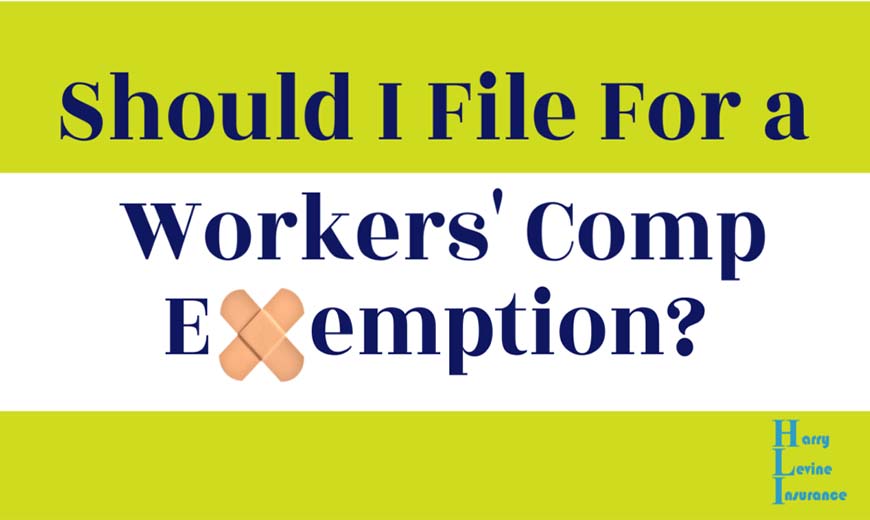Workers’ compensation insurance is a crucial—and often mandatory—part of owning a business in Florida.
But if you’ve owned a business for some time (or spent enough time around insurance agents), you might have heard of some business owners filing for a workers’ comp exemption.
Filing a workers’ comp exemption is a complex issue that should not be taken lightly. There are requirements that must be met and proper procedures to follow.
So what exactly is a workers’ comp exemption, how does it work, and is it right for you?
What is a Workers’ Comp Exemption?
Workers’ comp insurance is an extremely beneficial type of coverage, in that it protects you from costly legal and medical expenses in the event an employee is injured while on the job.
A serious injury or illness could lead to the need for lifelong treatment. Worker’s compensation covers this within the bounds of your policy so that your bank account doesn’t have to.
Under Florida law, businesses must carry workers’ comp insurance if they are:
- a construction business with one (1) or more employees (including corporate officers and LLC members);
- an agricultural business with six (6) regular and/or 12 seasonal workers who work between 30-45 days a year;
- a non-construction corporation or LLC with four (4) or more employees; or
- a state or local government office.
Businesses that do not meet these requirements (an accounting firm with only two employees, for example) are not required by law to carry workers’ comp coverage. (This does NOT mean they don’t need it, just that the law doesn’t require it.)
However, some businesses who do meet these requirements (for instance, an accounting firm with 10 employees) might choose to file for a workers’ comp exemption in order to save money on their premiums.
Filing a workers’ comp exemption allows these businesses to exclude their officers, directors, and owners from the state’s requirement to have workers’ comp coverage. Workers’ comp exemptions ONLY apply to officers/directors/owners; the law does NOT allow any business to exempt rank and file employees from otherwise mandatory workers’ comp coverage.
How to File for a Exemption
For starters, if you have less than the required amount of employees for workers’ comp coverage and are opting out of workers’ comp, there’s no need to file for an exemption.
A workers’ comp exemption is only necessary if you meet the legal requirements for carrying workers’ compensation but are choosing to exempt an officer, owner, or director of the company. If you do not have an active Notice of Election to be Exempt, the Florida Division of Workers’ Compensation can fine you.
State employees perform regular field inspections to ensure that businesses are complying with the law. If a business does not carry workers’ comp, fits the statutory requirement to have it, and has not filed for an exemption for its owners/officers/directors that brings them out of the statutory requirement, they will be fined.
Applications for workers’ comp exemptions must be made online through the Florida Division of Workers’ Compensation. For corporations in the construction industry, a $50 fee will apply (this is used to perform an audit). There is no cost for LLCs or non-construction corporations.
You will have to renew your certificate every two years.
Should I File for a Workers’ Comp Exemption?
Workers’ comp insurance is a great way to protect your employees from the lost wages and medical bills that come as a result of a workplace accident. They also protect your business from being sued by a litigious employee in most cases.
Any business—especially those in riskier industries—should never be without it.
LLCs and Corporations sometimes exempt their officers from coverage, which reduces premiums. However, the potential costs of a lawsuit (or paying for medical costs out-of-pocket) are worth the relatively minor investment of carrying this coverage in the first place.
Protect Your Assets
Risks, by their very nature, are unpredictable. No business owner, manager, or employee can prevent a workplace accident 100% of the time.
A workers’ comp exemption may save you a few bucks in insurance premiums, but the money you will save is nothing compared to the amounts you may have to spend if and when a workplace accident happens.
Owning a small business is a risky venture. Having the right level of insurance helps to ameliorate some of that risk, and workers’ comp insurance is no exception.
If you are looking for comprehensive insurance for your small business, we look forward to meeting with you and discussing your business, your goals, and your needs. Request a quote today.








